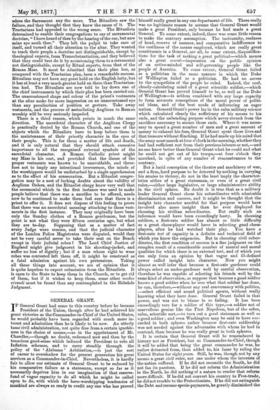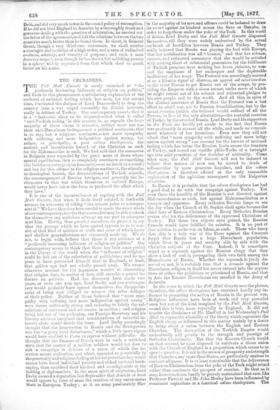GENERAL GRANT.
I F General Grant had come to this country before he became
President of the Union, though after he had achieved his great victories as the Commander-in-Chief of the United States, he would probably have been regarded with much more in- terest and admiration than he is likely to be now. An utterly tame-civil administration, not quite free from a certain ignoble- ness in the choice of means,—as in the appointment of Mr. Chandler,—though no doubt, redeemed now and then by the tenacious good-sense which induced the President to veto all Inflation schemes, and to carry steadily through the policy of the ' Alabama ' Arbitration,—is just the sort of career to overshadow for the present generation his great services as a Commander-in-Chief. Nevertheless, it is hardly fair to allow our estimate of General Grant to be reduced by his comparative failure as a statesman, except so far as it necessarily deprives him in our imagination of that reserve- fund of vague capacity to do all which he might be called upon to do, with which the hero-worshipping tendencies of mankind are always so ready to credit any one who has proved himself really great in any one department of life. There really was no legitimate reason to assume that General Grant would make a great President, only because he had made a great General. To some extent, indeed, there was some little reason to make the contrary assumption. The taciturnity, coolness of head, reserve of manner, and comparative indifference to the costliness of the means employed, which are really great constituents in a General, are all, to some extent, disqualifica- tions for the task of making a great_ political—which means also a great moral—impression on the public opinion of an active-minded and self-governing people like the people of America. To some extent, General Grant failed as a politician in the same manner in which the Duke of Wellington failed as a politician. Ile had no access to the sympathies of the people he ruled. Indeed, the cool, closely-calculating mind of a great scientific soldier,—which General Grant has proved himself to be, as well as the Duke of Wellington—is seldom combined with any large capacity
to form accurate conceptions of the moral power of politi- cal ideas, and of the best mode of influencing an eager nation. General Grant's power lay in the calm military science which calculated clearly the sufficiency of his means to his ends, and the unbending purpose which never shrank from the sacrifices necessary to secure those ends. Where it was neces- sary to spend a great number of men and a great amount of money to exhaust his foes, General Grant spent those lives and that treasure without flinching. If he had made up his mind that the army must march at four o'clock in the morning, whether they had had sufficient rest from their previous labours or not,—and no one knew better than General Grant what he could and what he could not get out of his troops,—at four o'clock they marched, in spite of any number of remonstrances to the contrary.
But a lucid conception of the theatre and machinery of war, and a firm, hard purpose to be deterred by nothing in carrying his armies to victory, do not in the least imply the character- istics either of a great statesman, or even of a great civil ruler,—either large legislative, or large administrative ability in the civil sphere. No doubt it is true that as a military leader General Grant chose his subordinates with admirable discrimination and success, and it might be thought that the insight into character needful for that purpose would have involved also more insight than he ever displayed for
choosing his civilian subordinates. But really such an inference would have been exceedingly hasty. In choosing soldiers, a first-rate soldier has almost as little difficulty as a great chess-player would have in selecting good chess- players, after he had watched their play. You have a first-rate test of capacity in a definite and technical field of which you know the exigencies. But in choosing civil subor- dinates, the first condition of success is a fine judgment on the complex result of a considerable number of mental and moral qualities for which there is no external test, and of which you can only form an opinion by that vague and ill-defined power called insight into character. Now you might almost as well infer that because a first-rate gardener could always select an under-gardener well by careful observation, therefore he was capable of selecting his friends well by the same kind of observation, as suppose that because a good soldier knows a good soldier when he sees what that soldier has done, he can, therefore,—without any real conversancy with politics, —select efficient and sound political agents, without really knowing what they have done. General Grant failed in that power, and was not to blame in so failing. It has been exceedingly rare for a soldier of this type,—a soldier not of marvellous genius like the First Napoleon, but of the sober, calm, scientific sort,—to turn out a good statesman as well as a good soldier ; and even Washington may be said to have suc- ceeded in both spheres rather because first-rate soldiership was not needed against the adversaries with whom he had to contend, than because he was really great in both spheres.
It is certain that General Grant will be remembered in history not as President, but as Commander-in-Chief, though it will be added that being the great commander he was, he rather detracted from, than added to, his fame by ruling the United States for eight years. Still, he was, though not by any means a great civil ruler, not one under whom the interests of the nation suffered. If he did not reconcile the South, he did not fan its passions. If he did not reform the Administration in the North, he did nothing of a nature to render that reform more difficult. If he did not convert his country to Free-trade, he did not truckle to the Protectionists. If he did not extinguish the Debt and resume specie-payments, he greatly diminished the
Debt, and did very much towards the sound policy of resumption. If he did not bind England to America by a thoroughly frank and generous dealing with the questiou of arbitration, he carried out the letter of the agreement, and left the relations between the two countries much better than he found them. In short, in General Grant, though a very third-rate statesman, we shall receive a strategist and tactician of a high order, and a man of unlimited coolness, sobriety, and tenacity of purpose ; and such a man deserves respect, even though he has shown but middling powers in a sphere widely separated from that which shed so much lustre on his name.



































 Previous page
Previous page